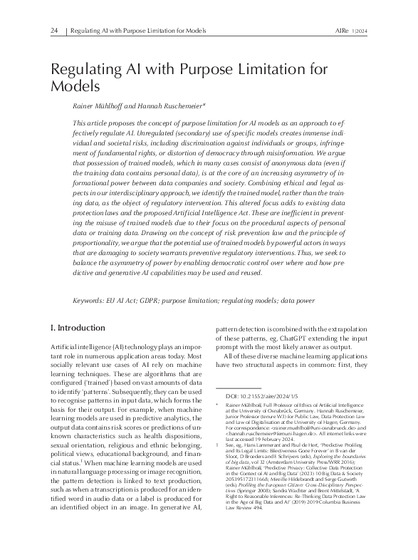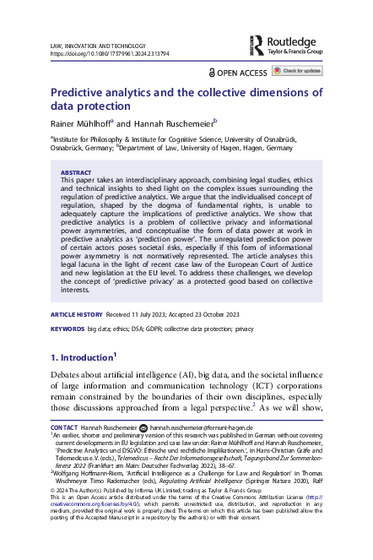Hauptinhalt
Topinformationen
Aktuelles
19.12.2024
Chaos Comunication Congress 38c3: Mit zwei Vorträgen dabei!
Wir sehen uns in Hamburg! Das Neueste aus der Forschung unseres Lehrstuhls präsentieren wir in diesen zwei Vorträgen:

- 28.12.2024, 12 Uhr: Gemeinwohlorientierte Forschung mit KI: Missbrauch eindämmen durch Zweckbindung für KI-Modelle (Rainer Mühlhoff und Hannah Ruschemeier).
- 29.12.2024, 11 Uhr: Chatbots im Schulunterricht!? Was können die Tools wirklich, was mchen sie mit der "Bildung", und sollten wir dafür Steuergelder ausgeben? (Marte Henningsen und Rainer Mühlhoff).
Alle Vorträge werden live gestreamed und aufgezeichnet.
12.12.2024
Studie zu "KI-Korrekturhilfe" für Lehrkräfte von Fobizz
Diese Studie untersucht das KI-gestützte Korrekturtool „KI-Korrekturhilfe“ des Unternehmens Fobizz, das Lehrkräften Unterstützung bei der Bewertung und Rückmeldung von Schülerarbeiten bieten soll. Im gesellschaftlichen Kontext eines überlasteten Bildungssystems und wachsender Erwartungen an den Einsatz von künstlicher Intelligenz zur Lösung dieser Probleme analysiert die Untersuchung die funktionale Eignung des Tools anhand von zwei Testreihen. Dabei zeigen die Ergebnisse erhebliche Defizite: Die numerischen Bewertungen und qualitativen Rückmeldungen des Tools hängen häufig vom Zufall ab und verbessern sich nicht durch die Einarbeitung der Verbesserungsvorschläge des KI-Tools. Eine Bestbewertung ist nur mit Texten erreichbar, die von ChatGPT geschrieben sind. Falschbehauptungen und Nonsense-Abgaben werden häufig nicht erkannt, und die Umsetzung einiger Bewertungskriterien ist unzuverlässig und intransparent. Da diese Mängel aus den fundamentalen Einschränkungen großer Sprachmodelle (LLMs) resultieren, sind grundlegende Verbesserungen dieses oder ähnlicher Tools nicht unmittelbar zu erwarten. Die Studie kritisiert den allgemeinen Trend, KI als schnelle Lösung für systemische Probleme im Bildungswesen einzusetzen. Sie kommt zu dem Schluss, dass die Vermarktung des Tools durch Fobizz als objektive und zeitsparende Lösung irreführend und unverantwortlich ist und mahnt zu systematischer Evaluation und fachdidaktischer Prüfung des Einsatzes von KI-Tools im Schulkontext.
01.10.2024
Fachtagung "KI x Kultur" in Hannover, 01. Oktober
Nächste Woche, am 1. Oktober, wird unsere Kollegin Annemarie Witschas einen Workshop im Rahmen der Veranstaltung „KI X Kultur“ in Hannover leiten. Wir freuen uns schon auf spannende Diskussionen mit Vertreter:innen der Kunstvermittlung und Kulturszene darüber, wie wir ein umfassenderes – und damit verantwortungsvolleres – Bild von KI im öffentlichen Diskurs fördern können.
Für mehr Informationen folgen Sie bitte dem beim Foto hinterlegten Link.
24.08.2024
Another tech is possible
Kritische und spekulative digitale Zukünfte

"Von fliegenden Autos bis zu virtuellen Cyberwelten: Eine Zukunft ohne smarte digitale Technologien erscheint heute kaum vorstellbar. Doch wessen Zukunft ist das eigentlich?
Zwar inszenieren sich Technik-Zukünfte oft als revolutionär, doch gleichzeitig verfestigen sie alte Vorstellungen, bestehende Machtverhältnisse und Lebensweisen. Woher stammen diese Zukunftsvorstellungen und wessen Absichten stecken dahinter?
Diese Fragen werden am 24.08.2024 von 11:00 bis 17:00 in der Kunsthalle im Rahmen eines Workshops kritisch, visionär, und spielerisch diskutiert. Gemeinsam erkunden wir, wie alternative, nachhaltige und sozial gerechte technische Zukünfte aussehen könnten, inspiriert von Methoden der kritischen Zukunftsstudien und des Design Futuring, sowie von feministischer Science-Fiction.
Es gibt Pausen mit Snacks und Getränken. Die Teilnahme ist kostenlos. Um eine Voranmeldung an outreachlab@ethikderki.de wird gebeten.
30.07.2024
Chatten mit Künstlicher Intelligenz – Risiken im Umgang mit Chatbots
Was sind Problematiken, Risiken, aber auch Chancen im Umgang von Menschen mit Chatbots? Wie sehen solche Beziehungen aus? Und welche ethischen und gesellschaftlichen Fragen gehen mit ihnen einher? Das sind Fragen, mit denen sich Nora Lindemann in ihrer Promotion beschäftigt und die im Zeitalter von ChatGPT und Co. eine große Relevanz haben. Zum Thema dieser Arbeit hat die Universität Osnabrück nun eine Pressemeldung veröffentlicht, die einen guten ersten Einblick in die Thematik bietet.
22.04.2024
Neuer Artikel im AI & Society Journal: "Chatbots, Search Engines, and the Sealing of Knowledges"
Abstract: In 2023, online search engine provider Microsoft integrated a language model that provides direct answers to search queries into its search engine Bing. Shortly afterwards, Google also introduced a similar feature to its search engine with the launch of Google Gemini. This introduction of direct answers to search queries signals an important and significant change in online search. This article explores the implications of this new search paradigm.
Drawing on Donna Haraway’s theory of Situated Knowledges and Rainer Mühlhoff’s concept of Sealed Surfaces, I introduce the term Sealed Knowledges to draw attention to the increasingly difficult access to the plurality of potential answers to search queries through the output of a singular, authoritative, and plausible text paragraph. I argue that the integration of language models for the provision of direct answers into search engines is based on a de-situated and disembodied understanding of knowledge and affects the subjectivities of its users. At the same time, the sealing of knowledges can lead to an increasing spread of misinformation and may make marginalized knowledge increasingly difficult to find. The paper concludes with an outlook on how to resist the increasing sealing of knowledges in online search.
15.03.2024
Purpose Limitation for AI Models
We are excited to announce the publication of our paper, “Regulating AI with Purpose Limitation for Models” by Rainer Mühlhoff and Hannah Ruschemeier, featured in the opening issue of the new journal “AI Law and Regulation”. In this groundbreaking study, we introduce the concept of applying purpose limitation to AI models as a novel approach to mitigate the unregulated secondary use of AI, addressing risks such as discrimination and infringement of fundamental rights.
Our interdisciplinary research highlights the increasing informational power asymmetry between data companies and society, suggesting that current regulations, focused mainly on data protection, fall short in curbing the misuse of trained models. By shifting the focus from training data to trained models, we advocate for a regulatory framework that emphasizes democratic control over AI’s predictive and generative capabilities, ensuring they are used in ways that are beneficial to society without undermining individual or collective rights.
This paper is a call to action for lawmakers, technologists, and the public to rethink how we regulate AI, aiming for a future where AI serves the public good while respecting privacy and equity. Dive into our full analysis and join the conversation on how we can achieve a more equitable and controlled use of AI technologies.
An earlier version of the paper was presented at the EAI CAIP – AI for People conference on November 24, 2023, in Bologna.
Feb 19, 2024
Predictive Analytics and Collective Data Protection
We’re excited to announce the final publication of our paper, “Predictive Analytics and the Collective Dimensions of Data Protection”, by Rainer Mühlhoff and Hannah Ruschemeier. Our interdisciplinary research blends legal studies, ethics, and technical insights to unravel the social implications of predictive analytics. Challenging the conventional, individualistic approach, we propose ‘predictive privacy,’ advocating for regulations that reflect the collective impact of data use. Dive into our exploration of societal risks and the imperative for new legal frameworks in the digital age.
5.2.2024
NDR Kultur – Das Journal über meine Arbeit
Unter dem Titel "Was sind die Risiken von KI?" hat NDR Kultur - Das Journal einen Bericht über die aktuelle Arbeit von Prof. Mühlhoff gemacht. Vielen Dank an Lennart Herberhold.
Weitere interessante Artikel:
28.12.2023 - Chaos Communication Congress Hamburg - Video KI – Macht – Ungleichheit
17.10.2023 - Public Philosophy journal - An Agenda For Change
17.04.2023 - Big Data & Society (open access) - “Predictive Privacy: Collective Data Protection in the Context of AI and Big Data”
12.10.2022 - Prädiktive Privatheit: Kollektiver Datenschutz im Kontext von Big Data und KI
08.09.2022 - Deutschlandfunk Nova – Sendung Hörsaal
29.08.2022 - Live bei WDR5 – Das Philosophische Radio








